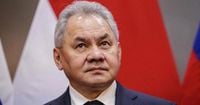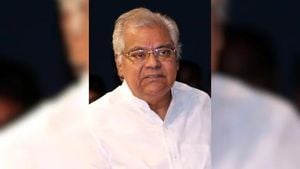In a recent statement, Sergei Shoigu, the former Minister of Defense of the Russian Federation and current Secretary of the Security Council, has raised alarms regarding the potential deployment of peacekeepers to Ukraine. He asserted that such a move, framed as a "coalition of those who wish," could escalate tensions to the point of triggering World War III. Shoigu emphasized that Moscow would regard these peacekeeping forces as "legitimate military targets," heightening fears of conflict between Russia and NATO.
During a video address presented at a security meeting of BRICS states in Brazil, Shoigu made it clear that the presence of Western military personnel in Ukraine is unacceptable to Russia. He stated, "I would like to emphasize that the deployment of military units from Western countries on Ukrainian territory is absolutely unacceptable for Russia. They will be considered legitimate targets for the Armed Forces of the Russian Federation." This statement underscores the Kremlin's firm stance against perceived encroachments on what it considers its sphere of influence.
Shoigu went on to describe the intentions behind the potential deployment of foreign peacekeepers, claiming that these nations are hiding their true motives. He stated, "In reality, foreign states want to introduce a contingent into Ukraine that will control its resources. It would be more accurate to call such military personnel occupants or interventionists." This assertion reflects a broader narrative from Moscow that portrays Western involvement in Ukraine as a direct threat to Russian sovereignty.
Moreover, Shoigu indicated that Europe is allegedly preparing for an occupation of the western regions of Ukraine, a sentiment he believes is not being acknowledged by the Ukrainian government. He remarked, "There are all signs of a planned occupation of the western regions of Ukraine by Europeans. But in Kyiv, this is stubbornly not seen or is deliberately ignored." This claim adds another layer to the already complex geopolitical situation in Eastern Europe.
In addition to these warnings, Shoigu also outlined the conditions under which Russia would agree to halt its military operations in Ukraine. He stated that the Russian proposals for resolving the ongoing crisis are well-known and consist of five key conditions. Firstly, he insisted that Ukrainian forces must withdraw from the newly annexed regions as defined by the Russian Constitution. Secondly, Kyiv must formally renounce its aspirations to join NATO, a point that has been a significant sticking point in negotiations.
The other conditions proposed by Shoigu include the denazification and demilitarization of Ukraine, along with the protection of the rights of the Russian-speaking population within its borders. These demands reflect Russia's long-standing concerns regarding the treatment of Russian speakers in Ukraine and its desire to maintain influence over the region's political landscape.
Earlier reports indicated that Ukraine might have been willing to recognize Russia's de facto control over the territories it has occupied. However, President Vladimir Putin deemed such an acknowledgment insufficient, suggesting that the Kremlin's objectives remain far more expansive than merely territorial recognition.
As tensions continue to rise, the international community watches closely. The prospect of peacekeepers entering Ukraine raises significant concerns about the potential for military confrontation. Shoigu's remarks serve as a stark reminder of the fragile state of affairs in the region and the high stakes involved.
In conclusion, the situation in Ukraine remains precarious, with Shoigu's statements highlighting the deep divisions and mistrust between Russia and the West. As both sides prepare for potential escalations, the call for diplomatic solutions becomes ever more urgent. The world waits to see whether dialogue can prevail over conflict in this increasingly volatile landscape.




